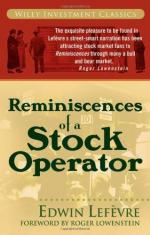
|
| Name: _________________________ | Period: ___________________ |
This test consists of 15 multiple choice questions and 5 short answer questions.
Multiple Choice Questions
1. Where does Livingston go when he leaves Boston?
(a) Florida.
(b) Pittsburgh.
(c) Washington D.C.
(d) New York.
2. How does Livingston portray himself to the small exchanges?
(a) Someone who is very, very wealthy.
(b) Someone who is very knowledgeable.
(c) Someone who has lost a lot of money on Wall Street.
(d) Someone who has never thought about stocks.
3. Why does it take Livingston so long to understand how to trade?
(a) He hates to study hard.
(b) He enjoys it so much he doesn't pay attention.
(c) He won't listen to his mentor.
(d) He is too confident in his own methods.
4. What has he regretted ignoring in the past?
(a) Strong hunches.
(b) His mentor's advice.
(c) Not liking a company.
(d) Stocks going down.
5. What does Livingston decide to buy next?
(a) He goes into oil stock.
(b) He decides to buy soy beans.
(c) He decides to corner the market in cotton.
(d) He moves back to high tech stock.
6. What type of time is the trading at a bucket shop?
(a) Several weeks.
(b) Over a lifetime.
(c) Short term.
(d) Long term.
7. What does experience give a successful stock trader?
(a) Friends.
(b) Respect.
(c) A job.
(d) Learning.
8. What kind of trading is done at a bucket shop?
(a) Superficial.
(b) Highly technical.
(c) Subjective.
(d) Throw back.
9. Who does the president of the Stock Exchange and the wealthiest bank go to see?
(a) John Rockefellow.
(b) The Railroad Union President.
(c) J. P. Morgan.
(d) The President of America.
10. What is Livingston's job at a bucket shop?
(a) Trader.
(b) Quotation boy.
(c) Stock broker.
(d) Runner.
11. When should one stay clear of a stock?
(a) Anytime it goes up.
(b) Right after it's public offering.
(c) When it acts erratically.
(d) During the down season for that business.
12. What does Livingston finally begin to study?
(a) Trading on margin and call.
(b) Bond and index funds.
(c) Longer-term stock movements.
(d) Mutual funds.
13. What do customers at a bucket shop do?
(a) Bet on a stock going up or down.
(b) Play the lottery.
(c) Buy stock.
(d) Buy feed buckets.
14. How are the quotes for stocks disseminated?
(a) Called in by phone.
(b) Sent to brokers by runners.
(c) Called out.
(d) Show up on a computer screen.
15. According to Livingston why should no one trade every day?
(a) It cost too much money.
(b) It is too tiring.
(c) It's not good for the soul.
(d) The excitement leads to mistakes.
Short Answer Questions
1. Why does Livingston take his profit out so fast?
2. What does Livingston discuss at the beginning of this chapter about stocks?
3. What does Livingston hear about a well known cotton trader?
4. Why does Livingston return to Boston?
5. How old was Livingston when he made his first $1000?
|
This section contains 494 words (approx. 2 pages at 300 words per page) |

|




